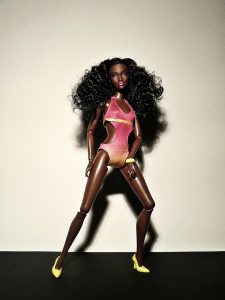Dolls play a pivotal role in the development of girls. I remember going to Toys R Us with my family to use the gift cards our uncle had given us for Christmas. I remember going through the aisle looking for that Easy Bake Oven I had been anxious to get. After I got it, I went to the doll section. I glanced through the dolls looking for one that resembled me. No Luck. So grabbed a doll from the long selection of white dolls. My grandma came over with my brothers and asked me if there were any black dolls. “No,” I responded. She quickly found an employee and kindly asked them if they had any ethnic dolls. The employee helped us look through the dolls and checked in back. Unfortunately, they had no luck in finding a black doll. I spent the rest of the money on something else. I was a bit disappointed but quickly got over it. I learned my importance and worth from my mother. What my mother didn’t tell me I found on my own. Thanks to community, to black media, and my spiritual interpretation; I have been greatly influenced by the black excellence I see. That I am pretty and important but, why is this something I had to find on my own?
Positive self-images should be poured into children. I can clearly see why it is important for stores to sell black dolls. Playtime Projects is an organization that collects toys for homeless children. “Author Debbie Behan Garrett explains, “When a young child is playing with a doll, she is mimicking being a mother, and in her young, impressionable years, I want that child to understand that there’s nothing wrong with being black. If black children are force-fed that white is better, or if that’s all that they are exposed to, then they might start to think, ‘What is wrong with me?’ By providing children with African-American dolls that reflect their beauty, we can help to instill in them a positive self-image.”
In my psychology class we have talked about the “Doll Study.” This was a study that’s was done in 1939 by psychologists Kenneth & Mamie Clark, it examined black children’s preferences for white and black dolls and found that the children tended to find the white doll to be “nicer” and more enjoyable to play with. Perhaps fewer people, though, are aware that this study was repeated in 2005 by the then 17-year-old Kiri Davis. She found similar results to the original study. While Dr. Thelma Dye of the Northside Center for Child Development cautions that these results should not lead to the assumption that all black children suffer from low self-esteem, she encourages continued exploration of the meaning of these studies.
Self-representation matters! Children should be able to think highly of themselves and see that they are thought highly of in society. Whether they are of African decent, European decent, Hispanic, or Asian, a child should be able see their culture present in the world. The United states is a country full of many different cultures and I believe those cultures should be represented and embraced in all communities. It should be easy to locate a variety of dolls that represent a wider spectrum of ethnicities wherever you may go. Children should be able to see dolls of all shades because that is the refection of the world.
